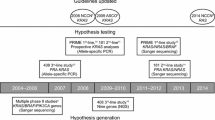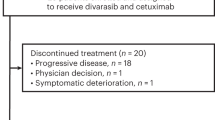Summary
Results of this year's ASCO saw significant steps towards an individualized therapy based upon genetic testing of KRAS. Numerous studies demonstrated that the effectiveness of epidermal growth factor receptor (EGFR) inhibitors is completely dependent upon KRAS mutational status. This led to the approval of EGFR inhibitor therapy in first and late-line therapy only in KRAS wildtype patients at least in Europe. In a retrospective analysis of the CRYSTAL trial Patients with KRAS wild-type tumours who received cetuximab were found to have a 1.2-month longer PFS and a 16% higher response rate compared with those who received chemotherapy alone. Patients with KRAS-mutant tumours who received cetuximab had 0.5-month shorter PFS and a 4% lower response rate than did patients with KRAS-mutant tumours who received chemotherapy alone. In the chemotherapy-only arm, KRAS status did not affect PFS or chemotherapy response. The same pattern of response was observed in the OPUS trial. Patients with KRAS wild-type tumours treated with chemotherapy and cetuximab had a 0.5-month longer PFS and a 24% higher response rate; for those with KRAS mutant tumours (99 patients, 42%), the addition of cetuximab was associated with a 3.1-month shorter PFS and a 16% lower response rate. In the chemotherapy-only arm, KRAS status did not affect PFS or chemotherapy response. The CAIRO 2 trial evaluated the combination of capecitabine (Xeloda), oxaliplatin (Eloxatin) and bevacizumab (Avastin) with or without the addition of cetuximab in patients with metastatic colorectal cancer. Overall, the addition of cetuximab resulted in an inferior PFS (9.6 vs 10.7 months) but did not affect response rate (44% in either arm) or overall survival (OS; 20.4 months). For KRAS wild-type patients (305, 61%), the addition of cetuximab did not affect PFS (10.5 vs 10.7 months). Antibody therapy combining cetuximab and bevacizumab has no clear benefit for patients receiving first-line chemotherapy plus bevacizumab and should not be used outside the context of a clinical trial. Further important topics in this year's ASCO included updates on the use, safety and efficacy of Bevacizumab in the first-line treatment of metastatic CRC as well as in the perioperative setting. Results of the NSABC-07 trials strengthened the role of oxaliplatin in the adjuvant treatment of stage III CRC.
Similar content being viewed by others
References
Van Cutsem, et al. Proc ASCO 2007,abstr. no. 4000
Van Cutsem, et al. Proc ASCO 2008, abstr. no. 2
Bokemeyer, et al. Proc ASCO 2007, abstr. no. 4035
Bokemeyer, et al. Proc ASCO 2008, abstr. no. 4000
Tejpar, et al. Proc ASCO 2007, abstr. no. 4037
Tejpar, et al. Proc ASCO 2008, abstr. no. 4001
Saltz, et al. J Clin Oncol, 25: 4557–4561, 2007
Hecht, et al. Proc ASCO GI 2008, abstr. no. 273
Punt, et al. Proc ASCO 2008, abstr. no. 4011
Berry, et al. Proc ASCO 2008, abstr. no. 4025
Purdie, et al. Proc ASCO 2008, abstr. no. 4103
Cassidy, et al. Proc ASCO 2008, abstr. no. 4022
Reinacher-Schick, et al. Proc ASCO 2008, abstr. no. 4030
Grothey, et al. Proc ASCO 2008, abstr. no. 4010
Hoechster, et al. Proc ASCO GI 2008, abstr. no. 280
Maindrault-Goebel, et al. Proc ASCO 2006, abstr. no. 3504
Maindrault-Goebel, et al. Proc ASCO 2007, abstr. no. 4013
Nikcevich, et al. Proc ASCO 2008, abstr. no. 4010
Wolmark, et al. Proc ASCO 2008, LBA abstr. no. 4005
Andre at al. NEJM, 350: 2343, 2004
De Gramont, et al. Proc ASCO 2007, abstr. no. 4007
Allegra, et al. Proc ASCO 2008, abstr. no. 4007
Carethers, et al. Gastroenterology, 98: 123–131, 1999
Sargent, et al. Proc ASCO 2008, abstr. no. 4008
Ribic, et al. NEJM, 349: 247–257, 2003
Author information
Authors and Affiliations
Corresponding author
Rights and permissions
About this article
Cite this article
Eisterer, W. Colorectal cancer. memo 1, 253–257 (2008). https://doi.org/10.1007/s12254-008-0069-3
Received:
Accepted:
Issue Date:
DOI: https://doi.org/10.1007/s12254-008-0069-3




